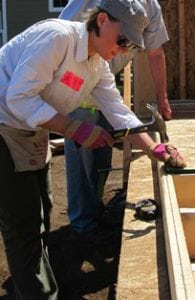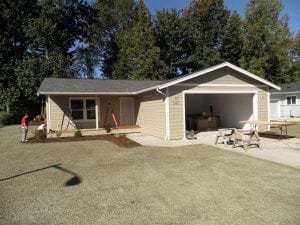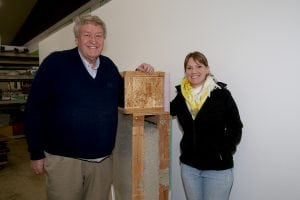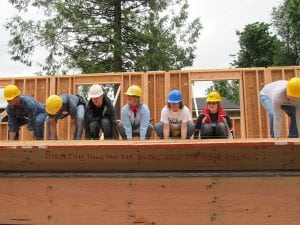Ever thought it would be fun to hammer and nail or learn how to use power tools? Alyssa Carpenter thought it would be a fun idea when she signed up to volunteer for Habitat for Humanity in Whatcom County at the Lynden Home and Garden Show. She soon received a call to see if she would be interested in taking on a leadership role with the Women Build program. Now she works with teams of women to help build homes and raise funds for the families struggling with poverty who benefit from the organization.

Habitat homes are generally built in 12 to 15 days, spaced apart by a day a week. Teams of 10 to 12 volunteers show up on their build day and work on the home together. “I really like Women Build because construction is generally a male dominated industry,” Carpenter shares. “It was really cool to see so many women out there building and taking charge. It was a great bonding experience.”
John Moon, Executive Director for Habitat for Humanity in Whatcom County adds, “Women are actually really good builders. They are meticulous builders and careful builders and they know how to ask questions.”
“It’s really empowering, getting comfortable with learning how to use the power tools,” Carpenter shares. “And it’s funny because in Ferndale this past summer they built Star Park in a week. It was like a marathon build. You had to sign up. If you had a red name tag it was because you were comfortable with power tools and if you had a blue name tag, maybe you weren’t. Right away I said, ‘Oh yeah, I’ll use those power tools’ and it was because I’ve used them on the Women Build projects before.”
At the beginning of a Habitat for Humanity build day, time is taken for volunteers to learn a particular skill that will be used during that day’s build, so someone who hasn’t used that tool before can easily pick up the new ability and then apply it during the day. “It’s a little scary at first but then you use it over and over on the build day and you become a pro,” Carpenter shares. “If you have questions you just ask the Construction Manager.”

Habitat for Humanity was started decades ago by Millard and Linda Fuller. It now has projects all over the world with about 35 affiliates in Washington State. The Whatcom County affiliate is currently working on the 37th home since its inception in 1988. Based on standards such as not profiting from the poor and giving “a hand up, not a hand out,” home owners through the program contribute 500 hours of sweat equity alongside volunteers. They also provide the $500 down payment on the home and continue to pay its mortgage, financed at a 0% interest rate.
In addition to the affordable mortgage payment, Habitat for Humanity homes are built to be energy efficient and produce a very low monthly maintenance cost. “You can heat these homes with the wattage of a hair dryer,” Moon shares. “That’s less than $20 a month.”
For our community, the charity’s “What Will You Build” pamphlet states that “42 percent of Whatcom County Residents earn less than the basic cost of living.”

“Typically, the habitat client is a single mom with kids working a job and a half,” Moon explains. “What we’ve found though working with single parents, but typically single moms, is that it’s incredibly empowering. Given the right nurturing atmosphere, when you’ve built your own house, you feel like you can do anything.”
Owning their own home not only moves a struggling family into a safe environment, it also means the children can continue education without the risk of moving or changing school systems. In addition, the home can be passed on for generations allowing permanent home ownership to extend down the family line. “With that major goal of elevating the poor out of poverty forever, the building of the home actually has become the greatest tool in our tool box,” Moon shares.
When it comes to volunteering for the organization, there are many ways to get involved. The Whatcom affiliate operates the Habitat for Humanity store where volunteers can work as cashiers, receive donated materials, price merchandise or drive a truck to pick up donated items. Volunteers are also needed in the office for data entry, mailings or reception. For building homes, individual volunteers can help out or preexisting community groups can decide to team up together. There are also youth builds where kids ages 5 to 25 can build on the home. And there is the Women Build program. “Just come out and try it,” Carpenter shares. “Don’t let the intimidation factor keep you away.”

Moon adds, “No matter what you feel your skill level is, it doesn’t matter. You don’t have to have any skills. You just have to have a willing heart to help.”
If you would like volunteer contact Janet Straka, Programs Manager, at volunteer@hfhwhatcom.org.
The Habitat for Humanity Store can be found at 1825 Cornwall Avenue in Bellingham. Merchandise is available for sale. Items for the store can also be donated by individuals or businesses.











































